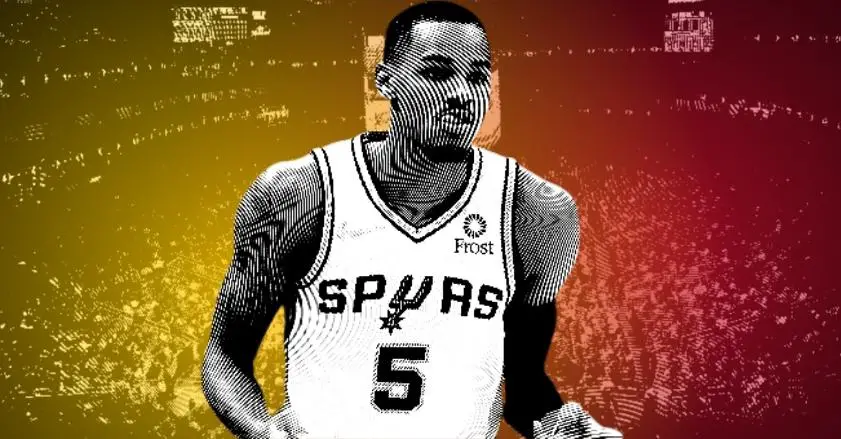We have our first real blockbuster trade of the offseason. The San Antonio Spurs sent newly anointed All-Star Dejounte Murray to the Atlanta Hawks for three first-round picks, a pick swap, and the contract of Danilo Gallinari.
For the Spurs, it signals a full-on rebuild before the start of the 2022 season. Next year’s draft, when a plethora of high-profile candidates will be available, looks mighty enticing. The Spurs don’t tank often, but the last time they tried they ended up with Tim Duncan, and that worked out okay.
For the Hawks, it means they fully expect to be contenders in the coming years. This is where President of Basketball Operations Travis Schlenk and I might disagree.
The Hawks are built around Trae Young, the itty-bitty teeny-weeny point guard with artillery range and laser-sight accuracy. He can drag any collection of half-decent three-point shooters to a top-five offensive ranking.
Defensively, however, he’s always left a bit to be desired.
Enter Murray, the spider-armed menace. He’s improved every healthy year of his career to this point, and last season put up a Harden-esque 21 points, nine assists, and eight rebounds (with an NBA-leading two steals) per game. He shot 33% from three last season, far below ideal but not entirely disastrous.
You can see what the Hawks are thinking. This is largely a similar team to the one that made the Eastern Conference Finals just 12 months ago, and Young has never had a running mate like this one.
Here’s the hope: Murray will compensate for Young’s defensive deficiencies (which, frankly, are shared with most of the Hawks’ perimeter players). He is a slithery-smooth driver who can attack the rim or drive in and kick out to shooters, weaponizing Trae Young’s off-ball game in a heretofore-unseen manner. The Hawks have simultaneously solved their no-Young point guard minutes (traditionally a massive problem) and their glaring point-of-attack defense issues by adding a player who can fit perfectly around Young or spell him as the situation requires. The surrendered picks are a cost of doing business, and Atlanta expects to be good enough going forward that they will be relatively low-value, anyway.
Here’s the problem: A lot of that is expecting stuff to happen that’s never happened before. We can’t assume that Young, who has never not had the ball in his hands and relishes every opportunity to pound the rock, will suddenly be able to replicate Steph Curry’s spot-up and cutting wizardry. Ask the Lakers how well telling a ball-dominant superstar to expand his off-ball game went for them!
Murray also isn’t a transcendent passer. He’s merely a fine one who put up massive numbers in a disciplined Spurs system that played to his strengths. His shooting doesn’t scare anyone, and when Trae has the ball, defenders will sag off Murrary to cheat toward Trae.
These last playoffs have really put into focus that having one elite defender is not as important as having five competent ones (spoilers: I have a LOT more to say about that topic, coming soon). Murray as the point-of-attack defender is a substantial regular-season upgrade, but that advantage will be mitigated in the playoffs when weak defenders are relentlessly subjected to an endless array of screens and re-screens. Young might be able to hide in the regular season, but Murray can only cover for him so much against good teams. Picture an octopus slowly cracking open a clamshell for the tasty, tasty meat inside, and that’s what every NBA coach can do to a defender like Young in a seven-game series.
The biggest problem is that Atlanta now has virtually no war chest left of enticing assets to add more big pieces. Versatile, unhappy big man John Collins is still there, and they’ll get something back if they decide to move him; but the return isn’t likely to be as helpful for winning basketball games as John Collins is right now.
This kind of trade is what oh-so-close teams do to take them over the top: think Jrue Holiday to Milwaukee in 2020. Atlanta should know they aren’t at that level yet.
Hope is a dangerous thing. It can cause teams to throw aside their better judgment, ignore the increasingly high-pitched voice whispering, “Don’t do itttt,” to grasp for an outcome that might have a 1% chance of occurring.
Some may commend Atlanta for going for the gold rather than playing the conservative waiting game. You never know when a championship window might open or close. This is basketball; there’s always a possibility that a freak maelstrom of injuries, implosions, shooting luck, unexpected chemistry, breakout performances, etc., can occur that propels Atlanta to a Finals appearance. But when you look at how many things they need to go right for that outcome, you realize that hope is a trap.
If you enjoyed this article, please subscribe to basketballpoetry.com to have articles like this delivered directly to your mailbox every Tuesday and Friday! Also, please follow me on Twitter @bballispoetry. Thanks!


